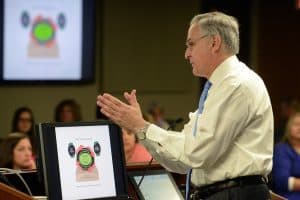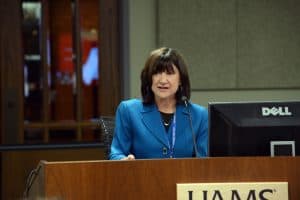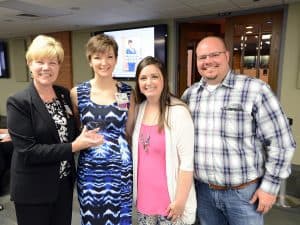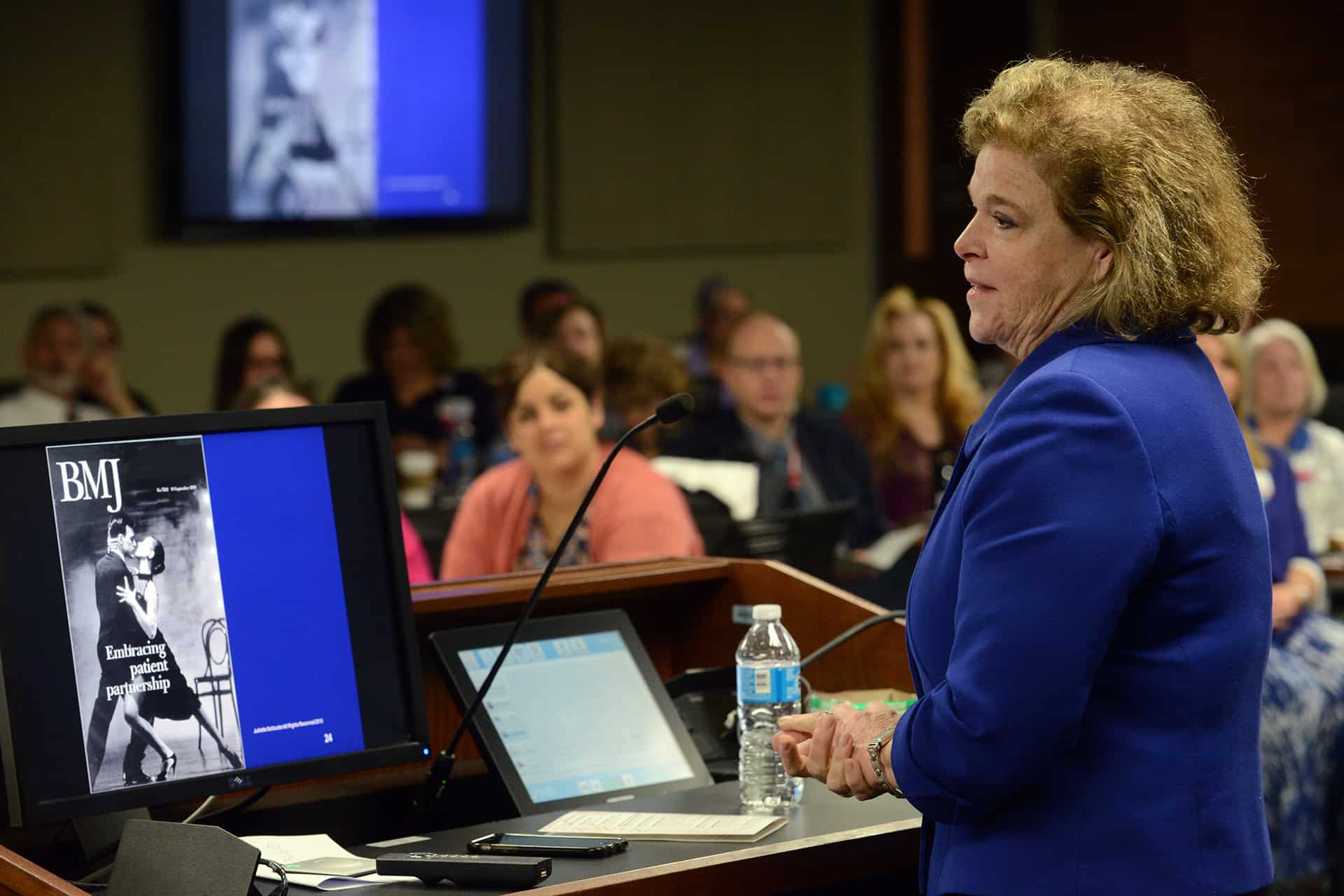UAMS Staff Learn Importance of Trust, Process in PFCC
| April 27, 2016 | Providing efficient patient- and family-centered care (PFCC) is much like doing the tango, Juliette Schlucter told a room full of UAMS faculty and staff April 19.
“First, you have to have enormous trust in your partner,” she said. “Second, you cannot fake it. You have to know the steps.”
Schlucter, who is director of the Center for Child and Family Experience in the Sala Institute for Child and Family-Centered Care at NYU Langone Medical Center, was the keynote speaker at UAMS’ annual PFCC Symposium. About 150 UAMS employees attended.

UAMS Chancellor Dan Rahn, M.D., speaks about the importance of partnerships between patients and families and hospital staff, and its positive impact on health care outcomes.
A married mother of three, Schlucter left a business career at Procter & Gamble after two of her children were diagnosed with cystic fibrosis. She spent 15 years in a PFCC leadership role at The Children’s Hospital of Philadelphia, beginning in 1995, before taking her current job at NYU Langone Medical Center.
Recalling her experiences both as a family caregiver and recipient, Schlucter talked about the importance of trust between patients and providers, as well as among hospital staff. In addition, Schlucter said, everyone from the patient to the health care staff has to know the process of care.
“That is the foundation of patient- and family-centered care,” she said. “It is how we support each other in a level of transparency that says we can share the steps, we can share the uncertainty, and we can build a culture of trust.”
Schlucter said it was important to patients and their families to feel involved in the decision-making, to be able to ask questions and to have things explained in an understandable way.

Stephanie Gardner, Pharm.D., Ed.D., UAMS provost and chief academic officer, talks about changes UAMS has implemented to improve patient- and family-centered care.
Reciting a quote from late American journalist Sydney Harris, Schlucter said, “‘The words information and communication are often used interchangeably, but they signify quite different things. Information is giving out; communication is getting through.’”
“I tell the medical students in my Doctoring 101 class,” Schlucter said, “this piece about getting through, whether it’s with a preceptor, colleague or patient, will be one of the most challenging aspects of your profession.”
No matter the job description, whether a health care provider or support staff, Schlucter said, everyone has an opportunity to make a difference.
She recalled years ago when her then 4-year-old daughter had suffered a collapsed lung. In the middle of the night, Schlucter, her husband and all three children rushed to a local hospital in Philadelphia. Getting out at the door, with three children in tow as her husband parked the car, Schlucter said she saw a tall, imposing security guard making his way toward her.
As he approached, he slipped a clipboard under my arm and said, ‘As we walk, sign in your daughter. I want to get her seen as fast as possible,’” Schlucter recalled. “When he said that, I felt my shoulders go down for the first time. I took a breath.

Roxane Townsend (left), M.D., UAMS Medical Center CEO, presents The Eli Award to Kerin Gray (second from left), R.N., with The Eli Award creators, Jodie and Jesse McGinley.
“He set the stage for a partnership,” she said. “His job description was to keep an urban medical center safe and secure. What he chose to do was meet me where I was, in language that was affirming, and it made all the difference.”
UAMS Chancellor Dan Rahn, M.D., said it was essential to develop strategies that help everyone, not just a select few.
“Unfortunately, in today’s society, many seem to believe that health care is like football, which indicates that in order for me to have more success, you must be having less,” said Rahn. “Health care is not like that; there is no finite amount of success. We all become more successful if everyone does better.”
Stephanie Gardner, Pharm.D., Ed.D., UAMS provost and chief academic officer, highlighted changes UAMS has made to its curriculum to promote interprofessional education that fosters better patient- and family-centered care.
“We have to make sure our students know the steps to providing efficient care and we have to start talking about those steps and how we function as a team,” said Gardner.
Kerin Gray, R.N., was honored at the Symposium with The Eli Award for her work in creating a compassion cart for patients who are dying. Together with other nursing staff on the H4 intensive care unit, Gray developed the resource to provide adult patient families with mementos and keepsakes of their loved ones.
The Eli Award was created in 2015 by Jesse and Jodie McGinley in memory of their son and to honor the UAMS and Arkansas Children’s Hospital (ACH) employees who helped them cope with the loss of their infant son. The award is presented to UAMS employees who create extraordinary moments for patients and families in a time of need.
Two programs received IMPACT Awards from the Center for Patients and Families for their innovation through interprofessional participation that impact the patient experience, and, ultimately, health outcomes. The programs received grants, one for the formation of a patient advisory council in the Cystic Fibrosis Clinic and the other to Internal Medicine to help purchase iPads to capture and monitor patient goal planning and assessment data.
